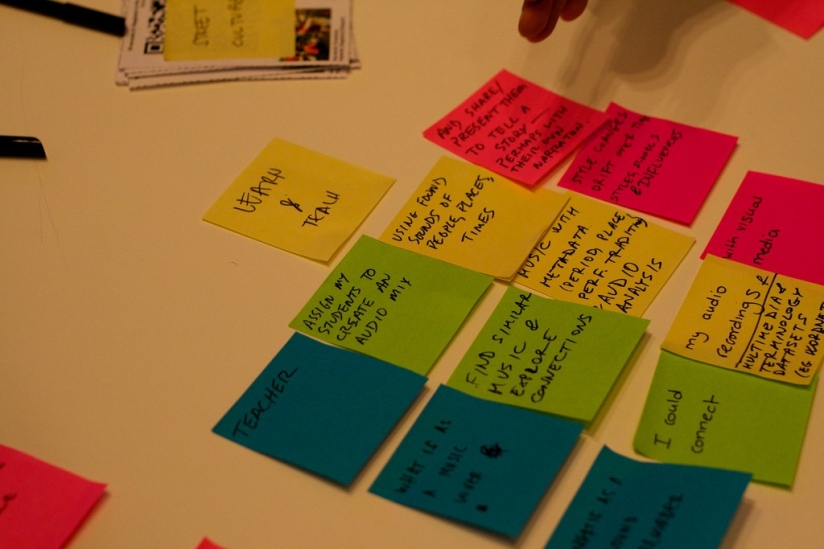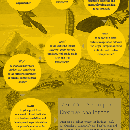| eCreative workshop In February 2013 Europeana launched an exciting new project that seeks to promote and facilitate greater re-use of cultural heritage resources. Through a series of pilot applications, open innovation challenges and spin off projects, Europeana Creative will demonstrate that Europeana, an online portal which provides access to over 26 million digitised objects, can provide the creative industries with both inspiration and actual content |
Starting the Evaluation of eCreative Pilots
Published on 02/24/2014 - Digital Heritage
Contributors: Platoniq
Now that some of the pilots under development have gone through the different phases of co-creation, identification of requirements, visual design, connection with Europeana content and different levels of basic performance, it is time to begin the prototype evaluation, especially in relation to usability and user experience. We will be assessing the learning materials created for Historiana in the History Education Pilot, as well as the two games related to natural history content, which have specific target audiences in the educational sector.
One of the critical aspects of any interface is the way end users interact with it (in this case, especially in connection with learning aspects). An early testing with people from different backgrounds usually helps to improve it, by incorporating new and fresh looks to the work being done. This method would help the three development teams to identify better ways of displaying features or options in the product, in relation to Europeana content or more broadly, when there's still time for improvements in the final product.
"How does this starting screen engage me?"; "Do I find the basic elements in order to clearly begin using the game or app?"; "Are the words in each menu easy to understand and follow?"; "How can I know where I am within this environment?"; "Can I reach the objectives of what's suggested in the product presentation?"...
Those are just some of the questions addressing important issues and indicators for the usability of the pilots, to be asked during the tests or right afterwards. Small groups will be tested using a method adapted from the think-aloud protocol and world café.

Prototype of one of the history education tools developed by Webtic for comparing and contrasting sources.
That's the aim of two events that will run simultaneously on March 3, as structured evaluation sessions at Platoniq's lab in Palma and the European Schoolnet in Brussels. Participants in the tests will sit separately to solve specific tasks, while we take notes and document their experiences. Those dynamics could represent different types of improvement, apart from a valuable interchange of knowledge between participants in the sessions, educators and experts in the field of online applications for learning.
We're looking forward to the results of these tests and the first evaluation meetings of the pilots. They mark a series of milestones in Europeana Creative, and are important developments parallel to the first call for our challenges... (Haven't you heard about our challenges yet? Here's the link to the call we just launched, don't miss this opportunity if you're a developer or a digital creative of any stripe!)
History Education Pilot
Historiana Learning Section

What: a digital learning resource for History Education
Aimed at: history students (14+) and their educators
Made by: EUROCLIO – European Association of History Educators, Webtic Consultancy, Usemedia and EUROCLIO's community of history educators
The objective of the Historiana learning section is to stimulate the re-use of digitised heritage, especially that made available through Europeana, in history education. In order to achieve this, EUROCLIO is working together with Webtic and an international community of history educators who work as professional volunteers on the creation of (online) learning activities.
Within the learning section, history educators can search a set of sources that are pre-selected by their relevance for history education, their quality and their license (that should allow for re-use in education). These sources can be searched by source type, people, locations and time. This set of sources includes newspapers, postcards, posters, diaries, music, monuments, official documents and newsreels, and they come from a range of digital collections from across Europe.
The learning section will result in the first tools that educators can use to make their own online learning activities to make best use of the digitised heritage. The two designs – one focused on the critical analysis of visual sources, the other on the work with multiple sources – contribute to the innovation of history education and use new technologies to promote historical and critical thinking skills.
The learning section will also contain learning activities that will be featured on the Historiana website as an example of how to implement certain teaching methods, overcome teaching challenges and/or how to promote the students' acquisition of historical thinking skills. The learning activities provide all the information needed for the students and their teachers to implement the activity in practice.
The examplar educational resources will focus on the First World War, but EUROCLIO is committed to developing resources on other key moments and developments in history, as well as new tools. The combination of free access and quality control will provide a unique social value for all stakeholders.
Natural History Education Pilots
There are two Natural History Education Pilots which both use different models and approaches and target different audiences. Both products are game-based and aim to introduce users to natural history content in an attractive, interactive and educational ways, whether that's at home with the family, or in schools and museums. The pilot products also aim to inspire creative industries to re-use digital cultural heritage content for educational as well as commercial purposes. The pilot core team consists of representatives of natural history museums, natural history scientists, education specialists, application and serious game developers and other specialists.
Memory Game – Europeana Kids
What: a digital memory game with educational improvements
Aimed at: school children
Made by: Semantika
The first product is a game based on the known principle of the memory game, using Europeana content and allowing users to create their own sets of content, with the editorial option of creating additional quizzes and the option to use the game in different contexts, for example, in museum exhibitions. The game will include several pre-defined sets of content from Europeana according to several attractive natural history themes with editorial options and quizzes. The option for the users to create their own sets will use the Europeana API and the users' MyEuropeana account. This game is developed by Semantika in collaboration with the National Museum in Prague.
Whilst the games are not main tools for the education of natural history, they can be used as additional explanation of this domain to give various audiences (not just schools) a window into natural history content. The promotion of natural history content via attractive and educative games is also of use to memory institutions, collection holders and the creative industries.Adventure Game
What: a first person hidden objects game
Aimed at: school children 12+, families, students, adults
Made by: Exozet Games
The Second of the products is an adventure game situated in a museum environment and designed as a first person hidden objects game. It takes place at the Museum für Naturkunde (MfN) and various other locations in Berlin, the National Museum in Prague and a secret island close to the Antarctic. The game tells a story about the secret legacy of Alexander von Humboldt including a mystery which needs to be unravelled by his descendant Sara. During her adventure, Sara needs to solve several puzzles and tasks to get all of the hints about where to find the pieces of a secret map and to discover the great secret that the completed map will reveal.
The educational aspects are built into the game in various ways – storyline, puzzles, object interaction, environment and additional information.
This game is developed by Exozet Games in collaboration with the Museum für Naturkunde in Berlin and the National Museum in Prague. It uses a combination of content from the natural history and the history domain.





 IMAGE
IMAGE IMAGE
IMAGE
